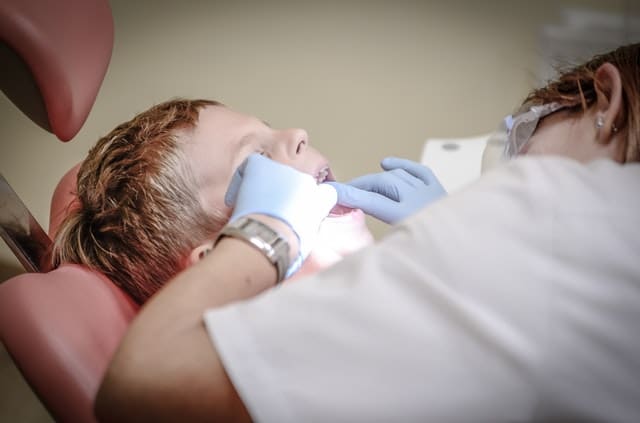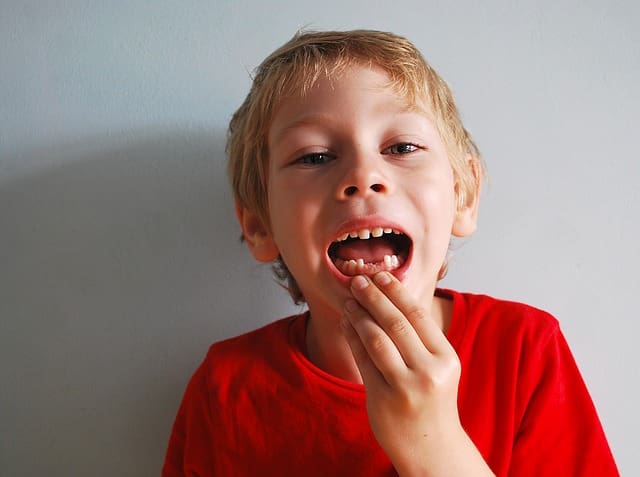All About Baby Teeth: Best Practices for Your Child
When it comes to caring for your child, healthy teeth are just as important as their overall health.
Your child’s primary teeth also called baby teeth play an instrumental role in their adult smile. During your child’s lifetime, they’ll grow up to 32 teeth in their mouth and use these teeth to help them speak and chew their entire lives.
Creating a strong foundation for your baby’s teeth to come in properly and their adult teeth to develop can help your child have a strong, beautiful smile throughout their lifetime. What are some best practices for parents when it comes to baby teeth?
It All Begins in the Womb

Did you know that your baby’s teeth start developing in utero at around six weeks? It’s important for the mother to eat a variety of nutrients during this time, including calcium and vitamin D, to help support healthy teeth for baby.
It’s also important that the antibiotic tetracycline not be taken during this time, as this medication has been known to cause a darker or stained tooth color in babies whose mothers have taken this drug during pregnancy.
By consuming a healthy diet rich in vitamins and minerals, you can help nourish your baby and support the development of strong teeth and bones for your child during pregnancy.
When and How Baby Teeth Erupt
As the fetus develops, the teeth form beneath the gums and will begin to erupt just a few months after birth and up to your baby’s first birthday. Every baby is different and so not all babies will see their first teeth at the same exact time.
First, your baby’s lower central incisors will come in, which are the two teeth in the center of the lower jaw. Next, the upper central incisors will come in along with the lateral incisors on both the upper and the lower jaw.
The canines and molars won’t come in until your baby is a bit older, roughly around 18 months of age, although the age will vary from child to child. The second molars will come in even later around two years of age.
And, of course, your child’s third molars won’t come in until your baby is much older, around the age of 17 or even in their early 20s.
Your Baby’s First Dentist Visit

When it comes to your dentist in Asheville, getting your baby used to the dentist is important for their regular checkups.
In fact, babies should have their first dentist visit around the time that their first tooth comes in. This is to ensure your baby’s teeth are developing properly and also to lower their risk for tooth decay. Unfortunately, as soon as babies have teeth, they are susceptible to tooth decay just like adults.
There are many benefits to getting your child acquainted with their local Asheville dental practice, so don’t put off this important first appointment to ensure your little one’s teeth are healthy!
Helping Your Child Through Teething
During teething, babies are likely to experience some discomfort and so may be irritable, not sleep well, drool more, and even experience loss of appetite. Fortunately, this period of time for your baby is temporary!
There are several ways you can help ease your baby’s discomfort during the teething process. You have the option to:
- Get a teething ring for your baby. Be sure the ring is made of a solid material such as rubber, as plastic materials such as liquid-filled teething rings can be punctured and pose a risk to your child.
- Freeze a washcloth. Try freezing a washcloth and then allowing your child to suck and bite on it. However, don’t give the washcloth to your baby if it’s frozen solid, as this could cause additional discomfort. The chewing action and the coldness of the washcloth will help ease your baby’s discomfort.
- Massage their gum tissue. Try giving your baby a gum massage with a clean finger during episodes of pain or irritability. The pressure from the massage can help them feel better!
It’s important to remember that teething rings and necklaces aren’t recommended for babies as they can pose a choking hazard. In addition, using over-the-counter pain (OTC) medication isn’t recommended as a first choice for baby’s teething pain. It’s essential to follow up with your family dentist in Asheville regarding the use of OTC gels or medication for your child.
The Importance of Primary Teeth

Some people think that just because a child loses his or her primary teeth that they’re not important in the grand scheme of your child’s oral health. However, this simply isn’t true.
Baby teeth are instrumental to your child’s oral health and the development of their adult teeth. They not only help guide permanent teeth into place, but can encourage proper speech and even self-confidence in your child.
Children who have healthy baby teeth also learn to enjoy healthy, crunchy foods such as vegetables rather than softer foods that may be more processed. In addition, having healthy baby teeth can keep the jaw strong and healthy as it develops and your child’s permanent teeth eventually erupt through the gumline.
Helping your child care for their primary teeth also sets up healthy oral care habits for life. Teach your child the importance of having a healthy smile and encourage them to brush and floss every day, eat healthy, and visit their dentist into adulthood.
Caring for Your Child’s Smile
As we mentioned, children are prone to nearly every oral health problem that adults can have once they have teeth. Caring for your child’s smile from the time they’re infants to the time they’re able to care for their own teeth and gums is going to have an impact on their oral health.
So how can you care for your baby’s smile throughout their early years?
In infancy, since your baby’s teeth haven’t come in yet, there’s no need to brush their gums. However, you can clean their gums with a clean piece of gauze or a washcloth after each feeding.
Once your baby officially has their first tooth, you can begin brushing the tooth with a tiny amount of toothpaste and a soft-bristled toothbrush. It’s important to note that the American Dental Association recommends using only a rice grain size amount of fluoridated toothpaste on children with teeth younger then the age of 3.
Once your baby has two teeth that touch, you can begin gently flossing in-between their teeth.
As your child gets older, you can teach them oral care habits that they can do themselves, but always supervise your child until he or she is old enough to conduct the routine on their own.
Keeping Kids’ Smiles Healthy
At Saunders DDS, we’re honored to help you keep your child’s smile healthy. Schedule an appointment with us at (828) 277-6060 for your child to keep their teeth and gums in great shape for life!
